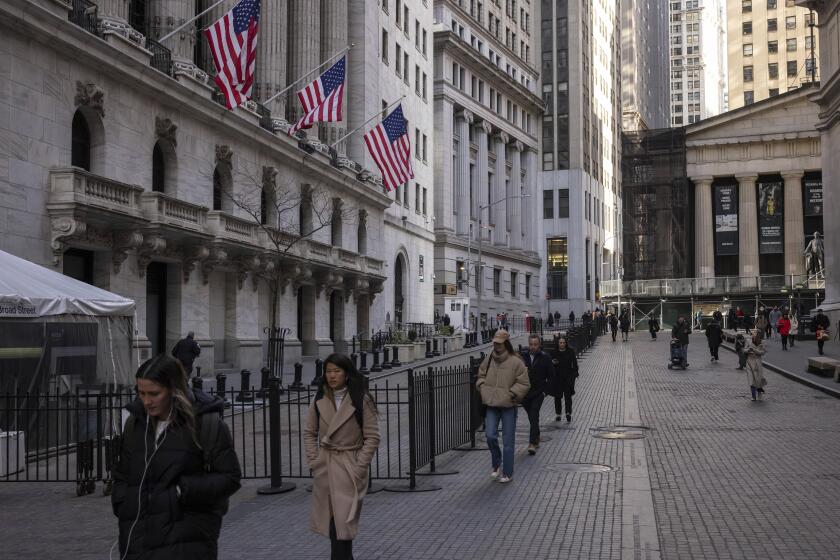TOP STORIES--Dec. 30-Jan. 4
Toasting an End to the Recession
The new year began on a somewhat hopeful note, as two key economic indicators suggested the recession is winding down.
The pace of layoffs after Sept. 11 slackened in December, but the unemployment rate jumped to 5.8% in December, its highest level since April 1995.
The number of workers on U.S. payrolls outside the farm sector fell a seasonally adjusted 124,000 in December, after a 371,000 drop in November.
Meanwhile, the nation’s disastrous slide in manufacturing may be coming to an end as the latest figures show the decline is slowing.
The December report from the Institute for Supply Management said its purchasing managers index rose to 48.2, the highest level for the gauge since October 2000.
Most analysts said they expect few manufacturers to add workers to their payrolls any time soon, and that the nation’s unemployment rate should continue to climb for several months.
*
Traders in a Buying Mood
Wall Street saw the new year get off to a good start last week, raising hopes that the market may be ready to end its two-year losing streak.
Fittingly, 2001 ended on a sour note Monday with a sharp New Year’s Eve sell-off. But after taking Tuesday off, traders came back in a buying mood.
Buoyed by hints that the economy may be stirring from its recessionary depths, and lacking any downbeat news, investors pushed stock prices higher for the rest of the week, led by tech companies such as Intel Corp. and Oracle Systems Corp.
For the week, the Dow Jones industrial average rose 1.2%, closing solidly above the 10,000 mark.
The Standard & Poor’s 500 index gained 1% and the Nasdaq composite index jumped 3.6%--bringing its post-Sept. 11 gain to 45%.
*
Light Trucks Pass Cars
Pickups, sport-utility vehicles and minivans outsold passenger cars in 2001 for the first time, thanks in part to unprecedented deals in the months after the September terrorist attacks.
U.S. vehicle sales defied expectations of a year ago and soared to their second-highest level in 2001, but some analysts say the incentive-driven sales surge in the fourth quarter may have come at the expense of sales in 2002.
General Motors Corp., which initiated no-interest financing and saw the benefits from it, said last week that it’s starting a new incentive program: $2,002 cash back on purchases and leases.
Because vehicles in the light- truck category accounted for more than half of the U.S. market, at about 51%, auto makers continue to pour resources into the development of new trucks.
A spate of new SUVs are to come, including the all-new Lincoln Navigator to be unveiled this week at the Los Angeles Auto Show, and new models from Ford, Volvo, Lexus, Land Rover and Hummer at the North American International Auto Show this week in Detroit.
*
Finally Getting Out of Town
In what is being interpreted as signs of a rebound, some of the country’s major tourist centers and attractions received a welcomed jolt in attendance over the holidays.
Fueled by heavy discounting, rising consumer confidence and plain old restlessness, theme parks in California and Florida reported packed crowds. Officials in Las Vegas said the arrival of some 300,000 visitors pushed the city’s hotel occupancy rate to 97% during the extended New Year’s weekend.
Hawaii, which has been devastated by a drop in tourism since Sept. 11, during Christmas week managed to attract 90% of the previous year’s total of visitors, tourism officials said.
Although analysts remained cautious about the near-term outlook for travel and tourism, they said the unexpectedly strong holiday activity reflects slow but steady recovery in the tourism industry.
*
Attention: Kmart Stockholders
An analyst’s report about the financial viability of discount retailer Kmart Corp. caused the stock to hit new lows last week.
The plunge was the latest in a series of troubles plaguing Kmart, which continues to be dogged by dirty stores, poor inventory controls, slow apparel sales and increased competition.
The Troy, Mich.-based chain’s same-store sales declined in October and November, falling below the company’s reduced expectations, despite its prominent position in the discount sector--one of the hottest retailing groups since the terrorist attacks.
The sell-off began after the release of a report by Prudential Securities analyst Wayne Hood, who took the unusual step of warning about a possible Chapter 11 filing if Kmart fails to boost sales in the first half of 2002.
Hood also issued a “sell” rating on the stock--another rarity among Wall Street analysts. Kmart officials, however, dismissed suggestions of a bankruptcy filing, saying the firm has plenty of financial resources.
On Friday, Kmart stock closed at $4.71 on the New York Stock Exchange, down 13% this year.
*
E-Day Dawns in Europe
Some described it as “euphoria,” the near-flawless launch of the European currency that more than 300 million Europeans adopted as their common currency.
The introduction of euro notes and coins is the tangible fulfillment of greater unity and integration of the Continent.
Getting the money into their hands was a signal event for Europeans, but the world’s largest exchange of currency appeared to be seamless.
Though many Europeans continued to bemoan the loss of their national currencies, the euro enjoyed a modest rise in popularity--and value--amid the final countdown.
It first began trading at a value of $1.17 to the dollar, but fell to 89 cents in New York by week’s end.
*
Taiwan Joins WTO Club
Taiwan formally joined the World Trade Organization after a decade-long bid to enter the global trading club.
Although Taiwan, the world’s 14th-largest trading economy, has fought for admission since 1990, it will bring mixed blessings to the island of 23 million people.
WTO membership will mean mostly cheaper prices for consumers, but it is certain to hurt agriculture and labor-intensive industries and to cause already record-high unemployment levels to rise even further.
But its WTO membership is raising hopes for better ties with its giant neighbor China.
*
Enron in the Hot Seat
A key Senate committee will use its subpoena powers to investigate the collapse of Enron Corp.
Sen. Carl Levin (D-Mich.), chairman of the Permanent Subcommittee on Investigations, said he intends to subpoena company documents for an examination of the conduct of Enron officers and the company’s auditor that led to the filing of the largest bankruptcy in U.S. history.
Meanwhile, Sen. Joseph I. Lieberman (D-Conn.), chairman of the Governmental Affairs Committee, plans to start hearings Jan. 24 that will focus on whether government agencies, such as the Securities and Exchange Commission, could have done more to protect employees and investors hurt by Enron’s financial meltdown.
At least five other congressional investigations are planned or underway.
*
Preserving Affordable Rental Housing
A Southland nonprofit organization has raised a $15-million private-investment pool to purchase California rental housing at risk of being removed from federal subsidy programs.
National Housing Development Corp. officials said they believe their new fund is the first of its kind in the nation to draw on private dollars to preserve affordable housing that is increasingly “flipping” to market rates.
The fund promises investors an 8% annual average return.
The group secured $13.5 million from nine financial institutions, which will receive federal Community Reinvestment Act credit for the three- to five-year investments, NHDC spokesman Bernard Sandalow said.
*
From Times Staff
For a preview of this week’s business and economic news, please see Monday’s Business section.






